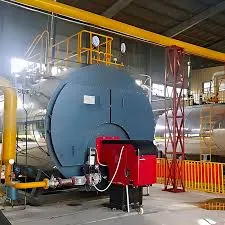
11-р сар . 11, 2024 04:21 Back to list
Thermal Fluid Heating Systems for Efficient Energy Transfer and Process Heating Solutions
Understanding Thermic Fluid Oil Boilers Efficiency and Applications
Thermic fluid oil boilers are an essential part of many industrial processes that require reliable and efficient heat transfer at elevated temperatures. Unlike traditional steam boilers that operate using water as the heat transfer medium, thermic fluid boilers utilize organic thermal fluids, which can achieve higher operating temperatures without the pressure associated with steam systems. This attribute makes thermic fluid boilers a popular choice in various industries, including chemical processing, textile manufacturing, food and beverage, and more.
How Thermic Fluid Oil Boilers Work
The fundamental principle behind thermic fluid oil boilers is the circulation of a heat transfer fluid, typically a synthetic organic compound, that possesses high thermal stability. The boiler heats this fluid using fuel, such as natural gas, oil, or biomass. Once heated, the thermic fluid circulates through an external heat exchanger or directly into the production process, delivering uniform heat where it is needed.
The design of a thermic fluid boiler includes a thermal oil heater, which contains a series of heating coils where the fuel combustion occurs. The combustion process generates hot gases that transfer heat to the thermal fluid circulating within the coils. This process is highly efficient, as it minimizes heat loss and reduces the footprint required for thermal energy generation.
Advantages of Thermic Fluid Oil Boilers
1. High Temperature Capability One of the most significant advantages of thermic fluid boilers is their ability to operate at high temperatures—often exceeding 300°C (572°F). This capability is particularly beneficial for processes that require precise temperature control and efficient heat transfer.
2. Lower Operating Pressure Unlike steam boilers that operate under high pressure, thermic fluid systems typically operate at atmospheric pressure. This lowers the risk of boiler explosions and makes the system inherently safer and easier to manage.
3. Energy Efficiency Thermic fluid heating systems are known for their energy efficiency. Their operation can result in lower fuel consumption compared to steam boilers, thanks to the ability to maintain constant temperatures with minimal heat loss.
4. Versatility Thermic fluid oil boilers can be utilized in various applications, including heating, drying, melting, and chemical processes. They are suitable for industries such as plastics, rubber, oil and gas, and pharmaceuticals, showcasing their versatility across different sectors.
thermic fluid oil boiler

5. Reduced Maintenance Requirements The maintenance of thermic fluid boilers tends to be less intensive compared to traditional boilers. The absence of high-pressure steam reduces wear and tear on the boiler components, resulting in longer operational life and lower maintenance costs.
Applications of Thermic Fluid Oil Boilers
Thermic fluid oil boilers are employed in a wide range of industries due to their superior heating capabilities. Some common applications include
- Chemical Manufacturing Many chemical processes require precise temperature control for reactions. Thermic fluid boilers provide the necessary heat, ensuring consistent product quality.
- Textile Industry In textile processing, heat is needed for dyeing, finishing, and drying fabrics. Thermic fluid systems deliver the high temperatures required without damaging delicate materials.
- Food and Beverage Processing Many food and beverage processes, such as oil extraction and cooking, utilize thermal oil heating for efficient temperature control and quality assurance.
- Plastics and Rubber The manufacturing of plastics and rubber products often involves heating materials at specific temperatures, making thermic fluid boilers a fundamental part of the production line.
Conclusion
In conclusion, thermic fluid oil boilers are a critical component of many industrial applications, thanks to their high efficiency, versatility, and safety features. As industries continue to evolve and seek more efficient and reliable heating solutions, thermic fluid boilers are likely to remain at the forefront of thermal energy applications. Understanding their operation and benefits can help businesses make informed decisions about their heating needs and enhance overall productivity in their processes. The future of thermal energy in industrial applications promises to be bright, with thermic fluid oil boilers leading the way.
-
High-Efficiency Commercial Oil Fired Steam Boiler for Industry
NewsJul.30,2025
-
High-Efficiency Biomass Fired Thermal Oil Boiler Solutions
NewsJul.30,2025
-
High Efficiency Gas Fired Thermal Oil Boiler for Industrial Heating
NewsJul.29,2025
-
High-Efficiency Gas Fired Hot Water Boiler for Sale – Reliable & Affordable
NewsJul.29,2025
-
High Efficiency Biomass Fired Hot Water Boiler for Industrial and Commercial Use
NewsJul.29,2025
-
High-Efficiency Biomass Fired Hot Water Boiler for Industrial Use
NewsJul.28,2025
Related PRODUCTS






















